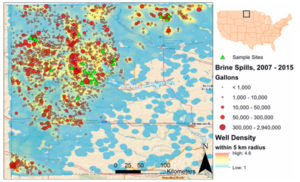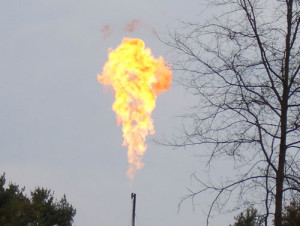In encouraging local news, The Environmental Advisory Committee, established by the Provincial Government of PEI to create a new Water Act, has recommended banning fracking in PEI. This conforms to the trend of the last few years, as the case against shale gas and fracking grows with each new study, regardless of topic – water contamination, public health, earthquakes, climate change, etc.
Recently, news on fracking has taken a decided about-face from the many stories previously singing its praises. The truth is beginning to emerge.
Quick Links: Download this update as pdf. Access all our updates by visiting the Our Resources page.
Water Contamination
- Pavillion, Wyoming has been the site of complaints on water contamination for many years. A preliminary finding by the EPA in 2011 found evidence of contamination, but political pressure forced the EPA to walk away from further research. Recently, researchers from Stanford University completed the work started by EPA and found that hydraulic fracturing had a “clear impact” on the groundwater, raising new concerns over the drilling method.
“When you look at everything as a whole, it seems implausible that all this is due to natural conditions,” DiGiulio (author) said. “When you look at the compounds, it’s a virtual fingerprint of chemicals used in the field.”
The study: ‘Impact to Underground Sources of Drinking Water and Domestic Wells from Production Well Stimulation and Completion Practices in the Pavillion, Wyoming Field’: http://pubs.acs.org/doi/pdf/10.1021/acs.est.5b04970
—————-
- The first ever study to measure groundwater quality from private water wells before, during, and after an expansion of horizontal drilling and hydraulic fracking was just published in the journal Science of the Total Environment. Lead author, Zacariah L. Hildenbrand, noted that, “we found that as more unconventional wells were drilled and stimulated, more drilling-related contaminants were found in the groundwater.’ Widely used industry chemicals were found in quantities above safe drinking water levels in water wells on highly fracked landscapes.
The Study: ‘Groundwater Contamination from Fracking Changes over Time’ – http://thetyee.ca/News/2016/05/07/Contamination-Fracking-Changes-Study/
The study: ‘Temporal variation in groundwater quality in the Permian Basin of Texas, a region of increasing unconventional oil and gas development’ – http://www.sciencedirect.com/science/article/pii/S0048969716308476
 Wastewater
Wastewater
- Thousands of oil and gas industry wastewater spills in North Dakota have caused “widespread” contamination from radioactive materials, heavy metals and corrosive salts, putting the health of people and wildlife at risk, researchers from Duke University concluded in a newly released peer-reviewed study.
The study: ‘Brine Spills Associated with Unconventional Oil Development in North Dakota’ can be downloaded from this article explaining it: http://ecowatch.com/2016/05/09/radium-lead-fracking/
—————
- Wastewater is also found to be contaminating surface water with endocrine disruptors in another study. Endocrine disrupting chemicals are associated with a myriad of illnesses and are widely used in the gas and oil business.
http://ecowatch.com/2016/04/06/endocrine-disrupting-chemicals-fracking/
The study (pdf): ‘Endocrine Disrupting Activity in Surface Water Associated with a West Virginia Oil and Gas Industry Wastewater Injection Disposal Site,’ can be downloaded at: http://www.healthandenvironment.org/uploads/docs/NagelsslidesJan182015.pdf
Health Concerns – Air and Water Contamination
- Benzene is a chemical used widely in the oil and gas industry and is known to be toxic and carcinogenic. It often shows up in cases of contamination. This study concentrated on the exposure of children to benzene during a flaring incident. “The results of the study reveal that children exposed to benzene experienced significantly altered blood profiles, liver enzymes, and somatic symptoms indicating that children exposed to benzene are at a higher risk of developing hepatic or blood related disorders.”
The study: http://www.tandfonline.com/doi/full/10.3109/08880018.2013.831511
—————

- The first comprehensive literature review to date on the respiratory health risks associated with unconventional oil and gas identifies benzene and four other fracking related chemicals that are linked to respiratory health issues on infants and children, including asthma, reduced lung and pulmonary function, increased susceptibility to infection, chest discomfort, difficulty breathing, lung inflammation and other adverse outcomes.
http://ecowatch.com/2016/05/12/respiratory-health-fracking/ and http://www.desmogblog.com/2016/05/12/air-pollution-fracking-puts-infants-and-children-risk-developing-heart-lung-conditions-new-study
The study: ‘Potential hazards of air pollutant emissions from unconventional oil and natural gas operations on the respiratory health of children and infants’ can be downloaded (pdf) here: http://ecowatch.com/wp-content/uploads/2016/05/fracking_study.pdf
————-
- Fracking chemicals and wastewater were examined for developmental and reproductive toxicity. As many other studies have noted, there was no information on the vast majority of the chemicals. However, evidence on 157 of them suggested toxicity, and 67 chemicals that are known or suspected to be toxic were proposed for federal water quality standards.
The Study: ‘A systematic evaluation of chemicals in hydraulic-fracturing fluids and wastewater for reproductive and developmental toxicity’ – http://www.nature.com/jes/journal/vaop/ncurrent/full/jes201581a.html
——————-
- Summary on Compressor Stations and Health Impacts: ‘Southwest Pennsylvannia Environmental Health Project’ – www.environmentalhealthproject.org
Climate Change
- New research has shown that another component of shale gas, ethane, has also increased in the atmosphere along with methane. While it is a short-lived greenhouse gas, like methane it is many times more powerful than CO2, and it also helps keep methane in the atmosphere for a longer period. The rise in ethane levels coincides with the advent of shale development.
This illustrates the difficulties of regulating an industry whose impacts are not fully understood. “The rapid scale of fracking has outpaced the scientific information we have on fracking,” analyst Pallavi Phartiyal of the Center for Science and Democracy at the Union of Concerned Scientists said in 2013, “and the regulatory response we have on unconventional oil and gas development.” http://ecowatch.com/2016/05/06/fracking-bakken-ethane/
The Study (pdf): ‘ Fugitive emissions from the Bakken shale illustrate role of shale production in global ethane shift,’ – http://onlinelibrary.wiley.com/doi/10.1002/2016GL068703/pdf
Earthquakes
- Canadian scientists have now linked earthquakes directly with the fracking process. They also suggest that many of the quakes experienced in places like Oklahoma may also be linked to fracking, but are being blamed on the many wastewater injection wells also present there.
http://www.desmogblog.com/2016/03/29/study-fracking-not-just-fracking-waste-injection-earthquakes and http://www.theglobeandmail.com/news/british-columbia/study-confirms-link-between-fracking-earthquakes-in-western-canada/article29427905/
The Report (pdf): ‘Hydraulic Fracturing and Seismicity in the Western Canada Sedimentary Basin’ here: https://scits.stanford.edu/sites/default/files/atkinson_canada_eq_study_clean.pdf
Other Problems
- Fracking sand mines cause many of the same type of health and environmental problems that fracking itself does.
Sand Mines That Ruin Farmland: http://www.nytimes.com/2016/05/23/opinion/the-sand-mines-that-ruin-farmland.html?emc=edit_th_20160523&nl=todaysheadlines&nlid=17408292&_r=0
Now….the Good News
12. 10 Fracking Infrastructure Projects Canceled or Delayed in the Last 24 Months http://ecowatch.com/2016/04/27/fracking-projects-canceled/
—————-
- The loophole in US law that exempted fracking wastewater from the laws governing industrial waste is being challenged in court.
Amy Mall, senior policy analyst at the Natural Resources Defense Council, said that it all amounts to a “toxic mess” in need of a legal fixing. “Waste from the oil and gas industry is very often toxic and should be treated that way”. “Right now, companies can get rid of their toxic mess in any number of dangerous ways—from spraying it on icy roads, to sending it to landfills with our everyday household trash, to injecting it underground where it can endanger drinking water and trigger earthquakes. EPA must step in and protect our communities and drinking water from the carcinogens, radioactive material and other dangerous substances that go hand-in-hand with oil and gas waste.”
Documents: IOGCC-Spawned Loophole Creating Frackquake Crisis Faces Federal Lawsuit – http://www.desmogblog.com/2016/05/24/iogcc-loophole-frackquakes-federal-lawsuit
